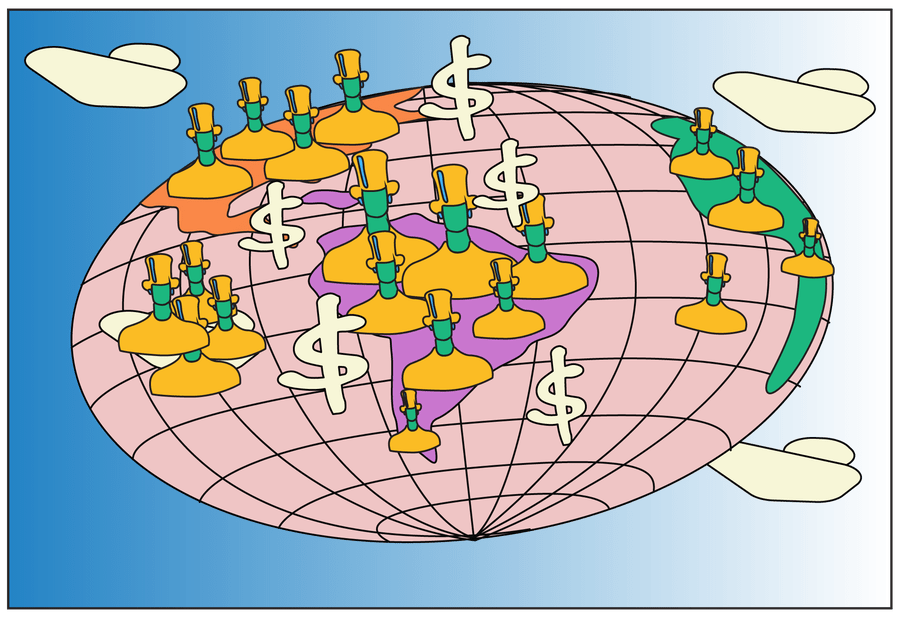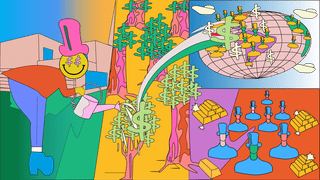
The fortunes of the super-rich have reached staggering levels, and for decades, inequality’s been rising.
To get a sense of the scale of the problem, here are three sources. First, Credit Suisse, whose "Global Wealth Report" has, for the past 10 years, documented the rise of the super-rich and the growth in global inequality, found in 2019 that the richest 10% in the world owned 82% of all wealth. The top 1% took 45%. The bottom half of the world’s population has only 1% of global wealth.
Why we’re publishing a series on billionaires
To make those numbers more vivid, Forbes’ billionaires list gives a real-time, daily update of the fortunes of the richest in the world. The top ten richest men (yes, all men) have a total of $967,000,000,000 – a number that will surely be incomprehensible to most of us.
A third source that is worth mentioning is Thomas Piketty’s book Capital in the Twenty-First Century. His research, which takes a longer-term view, reveals that, since the end of the 1970s, wealth inequality in most countries has been on the rise – and quite dramatically so.

Many citizens and scholars believe that some limited degree of inequality serves a function and is morally acceptable, but is there a point at which inequality becomes too large and the super-rich have too much?
Several years ago, I started to investigate the philosophical reasons we might have for the view that, at some point, when a person gets richer and richer, they have too much. In fact, this view has been put forward in somewhat different forms throughout the history of ideas.
I’ve suggested that we call this philosophical view – that there is a moral limit to how much we can have – limitarianism. It is not as demanding as some forms of egalitarianism, since limitarianism accepts that some level of inequality can be acceptable, though with a clear cap on how much inequality there could be. We could debate where, exactly, we should put that limit on wealth, but it certainly would rule out the current concentration of wealth among billionaires.
One striking feature in the reactions that people have when they hear about limitarianism is that some find it is self-evidently true, while others think it is an outrageous proposal. Clearly, in pluralist societies, citizens will differ in how much they care about equality and whether they think there is anything wrong with people being billionaires. As such, it’s important to look at the reasons why excessive wealth and extreme levels of inequality are wrong, so that we can make up our minds in an informed way.
The negative consequences of concentrated wealth
Some of these reasons against having too much have to do with the consequences of massive fortunes, independent of whether these fortunes have been acquired through entrepreneurial activities, from inheritance or another form of luck. Here are three of the most important of those bad consequences.
The first is that extreme wealth allows rich people to undermine democratic values, for example, through lobbying or massive campaign spending. An equal democratic playing field is also undermined if the super-rich have a much larger capacity to influence the creation of knowledge, information sharing and the shape of the public debate, which they do by setting up think tanks, establishing professorships at universities and buying up media outlets. In the US, the Koch brothers are a notorious case of billionaires distorting democracy, but the phenomenon can be found everywhere, albeit often at a smaller scale.
We should use the excessive wealth of billionaires to save the planet
A second bad consequence is that higher levels of wealth do not contribute much to our well-being and flourishing, whereas much human suffering could be prevented if that same money was spent on the elimination of poverty or societal challenges. A clear statement of this argument has been made by the effective altruists, who argue that all of us who can afford to make donations should not only try to do good with that money but also use it in a way that is most effective in doing good and eliminating suffering.
A third bad consequence of excessive wealth is that the billionaires are also much more involved in ecological destruction. For almost all of them, this is due to their lavish lifestyles, which are environmentally very damaging. The French economists Lucas Chancel and Thomas Piketty have estimated that these lifestyles lead the richest to have, on average, up to 30 times the average emissions of people in rich countries and up to 300 times the average emissions of citizens in countries with the lowest emissions levels.
Similarly, a recently released report by the Stockholm Environmental Institute and Oxfam provides further evidence that the rich, and especially the super-rich, are disproportionately responsible for greenhouse gas emissions. It would be much better to have green taxes that make the polluters pay, rather than subsidising the fossil industry, as is currently the case in many countries. We should use the excessive wealth of billionaires to save the planet.

Do billionaires deserve their wealth?
The super-rich and their defenders are generally not impressed by this type of reasoning. They argue that we might debate whether these consequences are all so bad, and that, in any case, they could be tackled in different ways – eg by regulating lobbying or introducing ecological taxation. But more fundamentally, they object to the moral force of these consequentialist arguments against excessive wealth, countering that these fortunes are the result of hard work and the enormous contributions they made to society. There is nothing wrong with the fortunes they amassed, they argue, because they deserve their fortunes.

The idea is that billionaires deserve their wealth because they can claim credit for the causes of this wealth creation. These causes could be hard work, their immense efforts, being smart or being talented. That hard work, those efforts or the invention caused by being smart and talented could lead to a product or service for which large demand exists in society – such as, for example, a vaccine for Covid-19, which is subsequently sold to many millions of people. Or it could be entrepreneurial activities that are sold massively, such as the sale of a song by an artist. In all these cases, the thought is that the wealth can be traced back to entrepreneurial success, and hence the wealth is deserved.
In political philosophy, this argument is known as the "desert-based argument", and the idea that we can take individual credits for our fortune is one that is also dominant in contemporary capitalist societies. However, political philosophers have argued repeatedly that if one analyses this argument carefully, it becomes clear that it is very weak – that it cannot be used to justify the wealth of the super-rich. In a nutshell, their arguments show that much of what the super-rich claim as “theirs” is, upon closer inspection, not (fully) attributable to them, but rather to factors beyond their control, including the structures, inventions and institutions created by others.
Fortunes belong to the collective, not the individual
Part of the answer of what is wrong with the fortune of billionaires was recently put very well by MacKenzie Scott, who is a billionaire thanks to her entrepreneurial activities with former spouse Jeff Bezos. She recently wrote a blog post that started with the following paragraph:
“Last year I pledged to give the majority of my wealth back to the society that helped generate it, to do it thoughtfully, to get started soon, and to keep at it until the safe is empty. There’s no question in my mind that anyone’s personal wealth is the product of a collective effort, and of social structures which present opportunities to some people, and obstacles to countless others.”
This statement captures the essence of why no one can claim that they fully deserve what they have earned. Extreme wealth is almost never the result of one person’s actions, but rather the result of the actions and choices of a lot of other people. Moreover, as economist Mariana Mazzucato showed in her book, The Value of Everything, many of the innovations on which entrepreneurs who made fortunes relied were dependent on innovations that had been funded by the government – and hence, the taxpayers. For example, the worldwide web, which has enabled the success of many of the super-rich, was invented at Cern, a public research lab funded by European taxpayers.
We cannot create prosperity without standing on the shoulders of generations before us, and hence, our own contributions to our success are limited.
Here is a thought experiment that drives the point home. Take any 21st-century billionaire and move them to a society with a limited infrastructure and a primitive level of science and innovation. It immediately becomes clear that most fortunes are not possible without relying on technology and institutions created by others and often paid for by taxpayers. You could consider this as a collective legacy, and then ask yourself how the fruits of that legacy are to be distributed.
The economist and political scientist Herbert Simon once wrote that some 90% of what we can earn in the marketplace is due to the inheritance of science, innovation and beneficial societal institutions that previous generations left us. When you look at the deeper causes of what we are able to do today in this way, it makes sense to argue that a much more radical redistribution is justified. Moreover, this point is independent of the “bad consequences” reasons I mentioned at the start: even if, for example, the urgent needs of others were all met, we still have to respond to the criticism that this is, to a large extent, the fruit of a collective legacy, making it impossible to claim that my fortune belongs to me morally.

The underlying variables of wealth creation
What’s more, supporters of the idea that billionaires deserve their wealth forget that luck and structures play a major role in our lives. And for both pre-existing structures, as well as for the influence of luck, we cannot claim any credit if they work at our advantage, nor should we be blamed if they work at our disadvantage. In the case of those living in poverty, this has been argued repeatedly: they are often poor not only because they have had too many spells of bad luck but also because they suffer from structures that disadvantage them much more than the middle classes and the rich. But how do luck and structures influence the lives of the rich?
Here are some of the factors that mostly determine the odds that we will be economically successful: the country in which we are born and the quality of its societal institutions, our innate talents and health, how we were raised and by whom, the public support we can call upon if we are not born in a rich family and so on. These factors have a great deal of influence on the opportunities we have in life and our chances of success, but we do not owe these factors to ourselves at all. We might just as well have been born somewhere else, with a different ticket from the natural lottery and a different set of structures and institutions that other members of society have created for us.
Properly crediting the vast role that luck and structures play in our lives does not imply that we should no longer be proud of our achievements – quite the contrary. After all, the efforts and creativity of individuals are always needed before prosperity is created, and anyone who makes an effort and is successful while playing the game fairly has every reason to be proud. But the awareness that luck and existing structures play such a major role in what we can achieve leads to a different attitude than the meritocratic one that claims the money I reap in the market is morally deserved.
We might just as well have been born somewhere else, with a different ticket from the natural lottery
Anyone who becomes economically and financially successful should therefore not be congratulating themselves with their success in the first place. Instead, they should be counting their blessings, being grateful with so much luck and then doing what befits that insight – namely standing up for fellow human beings who have been less lucky. And when, as citizens, we contribute to the political decisions regarding what kind of society we want, it means properly recognising that both luck and societal structures play a major role in what people can make of their lives.
Embracing this attitude would give us a reason to favour the post-second world war European welfare states, which have been in decline in recent decades. The welfare states supported those who had bad luck in life and included limits to earnings and wealth acquisition. Hence, they had a significant egalitarian effect. On the one hand, basic public provisions such as accessible tertiary education, pension systems and public health care meant that there were more genuine opportunities for all to create a good life. This was funded with a progressive tax system, which reduced economic inequalities.
Moreover, companies and firms often saw themselves as part of the communities in which they operated. In recent decades, however, the increasing stress on individuals’ own responsibility for their fate, rather than acknowledging the effects of structures and luck, has paved the way to dismantle the welfare states. As a consequence, many vulnerable citizens are worse off, and the rich encounter fewer restrictions to becoming super-rich.
What about exceptional productivity?
Another argument which defenders of billionaires might put on the table, as the Harvard economist Greg Mankiw did in his paper "Defending the 1%", is that top earnings reflect top marginal productivity. Because a CEO contributes so much to the productivity of the firm, he is able to command a very high pay (whether paid in salary or bonuses). But this is a theoretical claim without empirical support.
In reality, top incomes do not always primarily reflect the productivity of the top manager in question, but are instead the result of a set of shared norms and values of top executives who consider it normal for them to earn such high incomes. The extreme earnings of top managers do not reflect the very high added value that their work brings to the organisation or the company. They instead reflect what they are capable of negotiating in the labour market for top earners, and that negotiation also reflects what this group of people tell each other their work is worth.
Of course, there are reasons why some differences in pay can be justified. In part, some limited degree of wage inequalities can be justified on efficiency grounds: we simply want to have enough surgeons as a society, and it then helps to give people who are talented in this area the prospect of good pay. If a potential surgeon can earn as much as a yoga teacher or a bookseller, the question is whether we as a society will have enough surgeons.
In professions that are intrinsically or instrumentally valuable to society, we want people to receive financial recognition for great efforts – efforts to develop their own talents and skills, bearing greater responsibility or performing key functions in the service of organisations, companies or society. It is also a matter of paying respect to a person if we recognise the effort they make. Yet, these considerations can, at best, justify some (though limited) inequality in pay and not the excessive inequality that we have seen in recent years.
We may rightly tell ourselves that if we worked hard, we deserve a reward.
But no one can say that they deserve to be a billionaire.
Dig deeper
 The global financial system is collapsing. Here’s a three-step plan to take back control
The health of our domestic economies and the planet is tied to market forces that are largely invisible and little understood. As Covid-19 shakes the foundations of the world economy, rather than hope to restore it, let’s work to replace it.
The global financial system is collapsing. Here’s a three-step plan to take back control
The health of our domestic economies and the planet is tied to market forces that are largely invisible and little understood. As Covid-19 shakes the foundations of the world economy, rather than hope to restore it, let’s work to replace it.
 Poverty isn’t a lack of character. It’s a lack of cash
Our efforts to fight poverty are often based on the misconception that poor people must pull themselves up out of the mire. But the relentless struggle to make ends meet has serious effects on the brain. Poverty is not a lack of character – it’s a lack of cash.
Poverty isn’t a lack of character. It’s a lack of cash
Our efforts to fight poverty are often based on the misconception that poor people must pull themselves up out of the mire. But the relentless struggle to make ends meet has serious effects on the brain. Poverty is not a lack of character – it’s a lack of cash.


